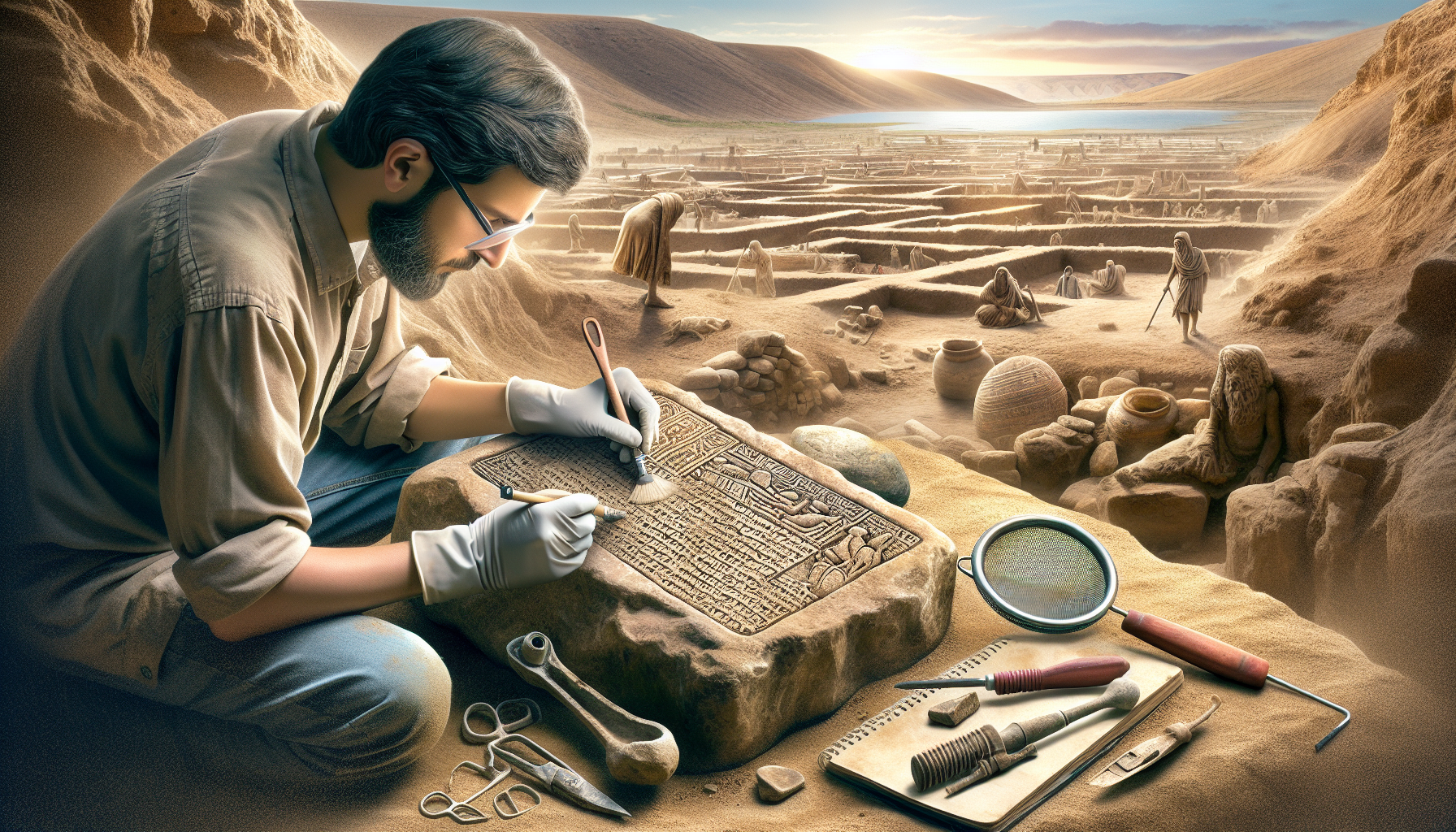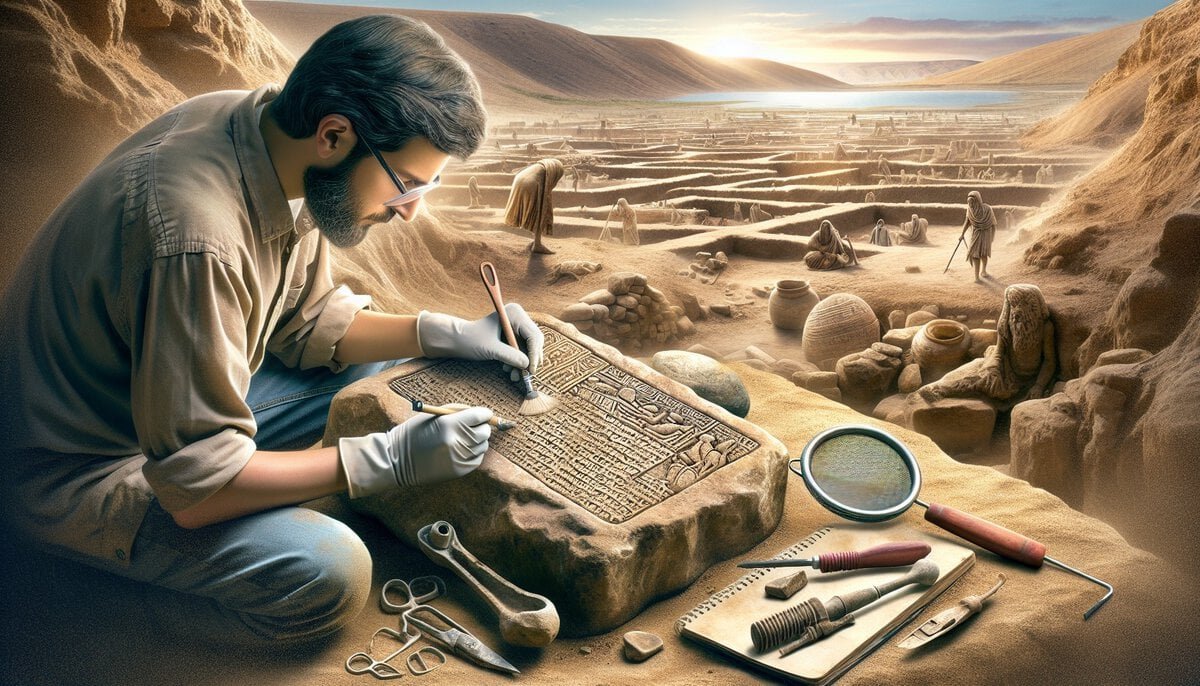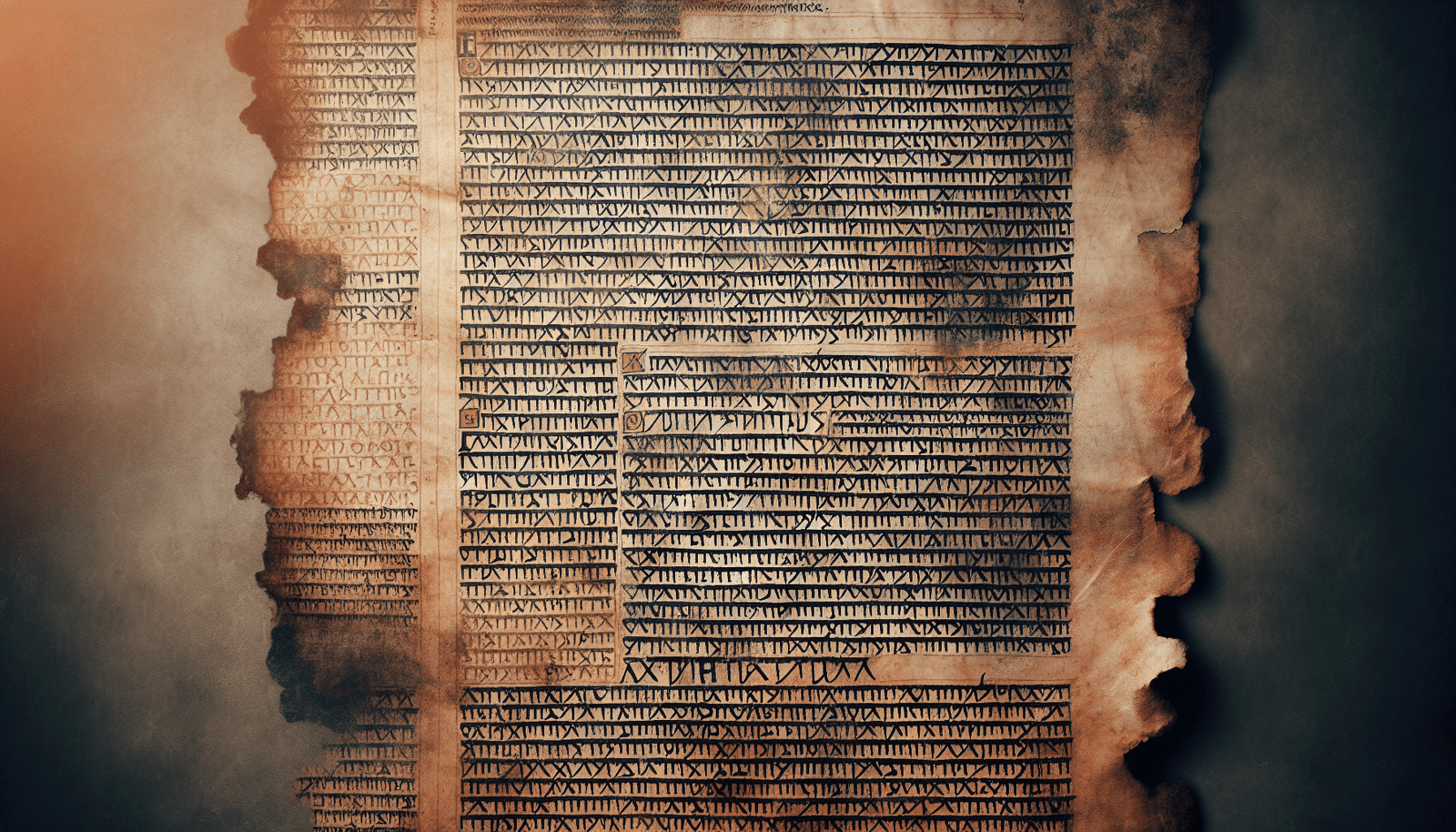In the ongoing battle against the illicit trade of historical artifacts, a group of dedicated individuals has emerged as the unsung heroes – biblical archaeologists. These passionate scholars tirelessly work to unearth the truth of the past, using their expertise to piece together ancient mysteries. However, they face a grave challenge – the rampant looting of archaeological sites. This article takes a closer look at the valiant efforts of biblical archaeologists as they fight to preserve our shared human heritage and prevent the loss of invaluable historical artifacts to the black market.

The Importance of Biblical Archaeology
Biblical archaeology plays a crucial role in preserving history and culture. Through excavations and research, archaeologists are able to uncover ancient artifacts and sites that provide valuable insights into the past. These discoveries shed light on various aspects of daily life, architecture, and religious practices of ancient civilizations. By studying and preserving these artifacts, we are able to honor and understand the cultural heritage of our ancestors.
In addition to preserving history, biblical archaeology also plays a vital role in validating historical accounts. The Bible contains numerous accounts of events and people from ancient times. Through archaeological findings, researchers can verify the accuracy of these accounts, providing tangible evidence that supports key narratives mentioned in ancient texts. This validation adds credibility to historical records and helps us better understand the contexts in which these events occurred.
Moreover, biblical archaeology offers an opportunity to gain a deeper understanding of ancient religious practices. The artifacts and structures uncovered during excavations give us insights into the beliefs, rituals, and religious customs of ancient civilizations. By studying these practices, we can trace the development and evolution of religions over time and gain a better understanding of their significance.
The Alarming Rise of Looting
Despite the importance of biblical archaeology, there has been an alarming increase in looting incidents in recent years. Looting refers to the illegal excavation and removal of artifacts from archaeological sites without proper documentation or authorization. This destructive activity not only robs us of our cultural heritage but also causes irreparable damage to archaeological sites.
Archaeological sites are treasure troves of information, but looting destroys the contextual integrity of these sites. Looters often tunnel into ancient structures or dig up artifacts haphazardly, causing significant damage to the layers of soil and materials that provide valuable historical information. Without proper excavation and documentation, the significance of these artifacts and structures is lost forever.
The illegal trade and smuggling of looted artifacts further exacerbate the problem. Looted artifacts often find their way into the international market where they are sold to collectors and museums, fueling an illicit trade that robs communities of their heritage. The money generated from this trade often funds criminal activities, contributing to instability in affected regions.
The Battle Against Looting
To combat looting, there is a need for collaboration between archaeologists and law enforcement agencies. This partnership allows for the development of strategies to identify and apprehend looters, as well as recover stolen artifacts. By working together, archaeologists and law enforcement can disrupt and dismantle the networks involved in the illegal trade of looted artifacts.
Creating awareness and education is also crucial in the battle against looting. By informing the public about the importance of preserving cultural heritage and the detrimental effects of looting, we can foster a sense of responsibility and encourage individuals to report looting incidents. Educational programs that highlight the value of archaeological sites and artifacts can help instill a sense of pride and ownership among local communities, making them active allies in the fight against looting.
Implementing stricter regulations and penalties is another essential step in combating looting. Governments and international bodies must enact and enforce legislation that prohibits the looting and smuggling of artifacts. Penalties for those involved in looting should be severe to deter potential offenders. By making looting a less lucrative and more risky endeavor, we can discourage this destructive practice.
Techniques and Technologies Used
Biblical archaeologists employ a range of techniques and technologies to aid in their research and excavations. Remote sensing and aerial surveys, for example, allow archaeologists to gather data about the landscape and identify potential sites of interest. These methods help save time and resources by narrowing down areas for excavation.
Ground-penetrating radar (GPR) is another valuable tool used in the field of biblical archaeology. This non-destructive technique allows archaeologists to investigate what lies beneath the surface without the need for extensive excavation. GPR uses radar pulses to detect changes in subsurface materials, revealing buried structures and artifacts that may be of archaeological significance.
Laser scanning, or LiDAR technology, is yet another advanced method employed by archaeologists. This technology uses laser beams to generate highly detailed scans of archaeological sites, capturing precise 3D data. LiDAR allows researchers to create accurate digital models of structures and landscapes, facilitating analysis and interpretation without putting the actual site at risk of damage.
By using these techniques and technologies, biblical archaeologists can conduct their research more efficiently and minimize the impact on archaeological sites.
Challenges Faced by Biblical Archaeologists
Despite the importance of their work, biblical archaeologists face numerous challenges that impede their progress. Limited funding and resources often hinder their ability to conduct thorough excavations and research projects. Archaeological digs require significant financial investments, including equipment, permits, skilled labor, and ongoing analysis of findings. Insufficient funding makes it difficult to carry out comprehensive work and may result in incomplete or inadequate investigations.
Navigating complex legal frameworks is another challenge faced by biblical archaeologists. Archaeological sites are often subject to regulatory frameworks that vary from one country to another, making it difficult for researchers to navigate the necessary permits and permissions. The bureaucratic hurdles can slow down or even halt excavations, limiting our understanding of ancient civilizations.
Political instability in certain regions further complicates the work of biblical archaeologists. Armed conflicts, civil unrest, and shifting political landscapes pose significant risks to archaeological sites. These unstable conditions not only hamper the ability to conduct fieldwork but also increase the chances of looting and destruction. The safety of archaeologists and their team members becomes a primary concern, often preventing them from carrying out their work in these areas.
Global Efforts to Combat Looting
Recognizing the need for concerted global action against looting, various conventions and treaties have been established. The UNESCO Convention on the Means of Prohibiting and Preventing the Illicit Import, Export, and Transfer of Ownership of Cultural Property is one such international agreement. This convention aims to restrict the trade in illicitly obtained cultural property and foster cooperation among nations to prevent the illegal looting of archaeological sites.
Interpol, the international police organization, also plays a crucial role in combating art and antiquity crimes, including looting. Through its Works of Art Unit, Interpol coordinates efforts among law enforcement agencies worldwide, facilitating the recovery of stolen artifacts and the apprehension of those involved in the illicit trade. Interpol works closely with archaeologists and provides the necessary support and expertise to investigate and combat looting.
Collaborative projects and initiatives have been instrumental in the fight against looting. National and international organizations, alongside academic institutions and local communities, join forces to protect heritage sites and prevent the illegal trade of looted artifacts. These collaborative efforts foster knowledge sharing, capacity building, and community empowerment, making significant strides in the preservation of our cultural heritage.
Case Studies: Successes and Setbacks
In the battle against looting, there have been both successes and setbacks. One notable success is the recovery of stolen artifacts. Through the collaborative efforts of archaeologists, law enforcement agencies, and international organizations, stolen artifacts have been successfully located and returned to their countries of origin. These recoveries not only restore a sense of pride and identity to affected communities but also serve as a deterrent to future looters.
Legal actions against looters have also made an impact. Prosecuting individuals involved in looting sends a clear message that this behavior will not be tolerated. By holding looters accountable for their actions, we establish a precedent that protects archaeological sites and artifacts from further destruction.
However, it is important to acknowledge the damage caused by looting. Countless archaeological sites have been decimated by looters, leaving behind permanent scars on our shared history. Buildings are reduced to rubble, artifacts are lost forever, and the opportunity to uncover untold stories is erased. The setbacks faced in the fight against looting remind us of the urgent need for continued efforts to safeguard our cultural heritage.
The Role of Local Communities
Local communities play a crucial role in the fight against looting. Engaging and empowering these communities is essential to ensure the long-term preservation of archaeological sites and artifacts. By involving local residents in the preservation process, we can establish a sense of ownership and pride, making them actively invested in protecting their cultural heritage.
Providing alternative livelihoods is one way to engage local communities. By offering training and employment opportunities in fields related to archaeology and cultural tourism, we can create economic incentives for communities to preserve their heritage. Investing in sustainable tourism and supporting local artisans and craftspeople can also provide income-generating opportunities, reducing the reliance on looting as a source of income.
Educational programs and community workshops are powerful tools to raise awareness and foster a sense of responsibility among local communities. These initiatives help individuals understand the importance of preserving their cultural heritage and empower them to actively participate in its protection. By instilling a sense of ownership and appreciation, we can build a sustainable future where archaeological sites are safeguarded for generations to come.
Ethical Considerations in Archaeological Work
In addition to the practical challenges faced by biblical archaeologists, there are also ethical considerations that must be taken into account. Proper excavation and documentation are of utmost importance to ensure the integrity and reliability of archaeological findings. Excavations must be conducted systematically and following rigorous scientific protocols to ensure accurate interpretation and analysis.
Responsible handling and storage of artifacts are equally critical. Proper conservation methods should be employed to prevent damage or deterioration of the artifacts. This includes maintaining appropriate temperature and humidity levels, using archival-quality materials for storage and display, and implementing measures to protect artifacts from theft or vandalism.
Respecting indigenous and local communities is an ethical imperative for biblical archaeologists. It is important to engage in meaningful consultations and collaborations with these communities, ensuring that their knowledge, perspectives, and values are respected and incorporated into the research process. This approach fosters mutual respect and understanding, avoiding the exploitation or marginalization of indigenous and local voices.
The Future of Biblical Archaeology
The future of biblical archaeology holds great promise, with advancements in technology and research methods on the horizon. The continued development of remote sensing techniques, such as satellite imaging, can provide invaluable insights into archaeological landscapes. Advanced analytical methods, such as DNA testing and isotopic analysis, can offer new avenues for understanding ancient populations and their migration patterns.
Increased collaboration and knowledge sharing will further enhance the field of biblical archaeology. By fostering partnerships between researchers, institutions, and communities, we can tap into a wealth of collective expertise and resources. Collaborative efforts will not only accelerate research but also ensure the preservation of cultural heritage through the sharing of best practices and successful strategies in combating looting.
Ultimately, the preservation of heritage for future generations relies on our collective commitment and determination. By recognizing the value of biblical archaeology and the importance of protecting our cultural heritage, we can safeguard the past for the benefit of future generations. Through collaborative efforts, technological advancements, and ethical considerations, we can ensure that the unearthing of truth continues to shed light on ancient civilizations and enrich our understanding of the world around us.






